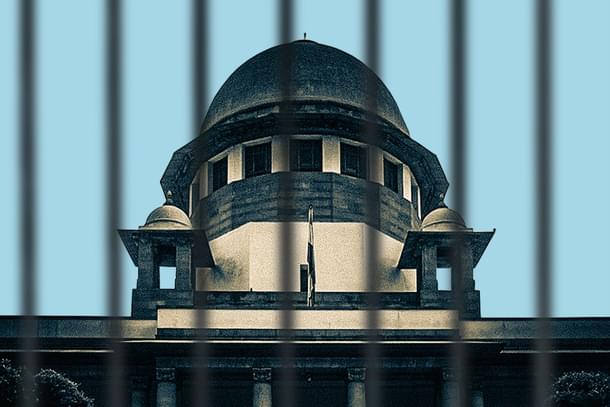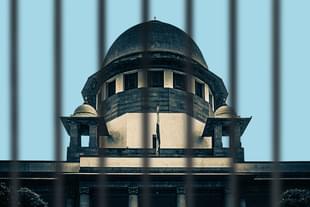Legal
The Ideological Elite Wants Justice Shekhar Yadav Silenced
Shubhendu Anand
Jan 20, 2025, 10:44 AM | Updated Jul 07, 2025, 04:48 PM IST
Save & read from anywhere!
Bookmark stories for easy access on any device or the Swarajya app.


In a disturbing display of ideological authoritarianism cloaked in legal activism, thirteen Senior Advocates have written to the Chief Justice of India, asking to direct the Central Bureau of Investigation (CBI) to lodge an FIR against Justice Shekhar Kumar Yadav for a speech he delivered at a Vishva Hindu Parishad event.
This unprecedented move seeks to weaponize India’s premier investigative agency against a sitting High Court judge solely for exercising his right to free expression. This act of bullying and villainising a judge sets a dangerous precedent, where expressing an inconvenient opinion becomes grounds for prosecution.
These advocates frequently proclaim themselves defenders of free speech and champions of dissent. But they now seek to weaponise state machinery to punish a judge for exercising the very rights they claim to uphold. Their actions are nothing short of ideological policing. They are determined to silence voices they cannot tolerate.
This tactic reeks of authoritarianism and is disturbingly reminiscent of regimes where dissent was crushed through intimidation and pre-censorship. The invocation of the CBI, an agency they routinely accuse of political misuse, highlights their opportunistic and self-serving duplicity.
This unholy cabal, led by the likes of Indira Jaising, Anand Grover, Mihir Desai, and Navroz Seervai, has plunged to depths of intellectual dishonesty and moral bankruptcy that are nothing short of Orwellian. Indira Jaising has, for years, criticised investigative agencies like the CBI as tools of state oppression.
When her own residence was raided by the CBI, she decried the move as an assault on democracy, claiming she was being “targeted” for her work. The irony is now inescapable. The same Jaising, who has built her reputation on railing against state overreach, now demands that the CBI transform into an ideological enforcer to punish a sitting judge for exercising his right to free expression.
Jaising's husband and ideological ally, Anand Grover, is no stranger to controversy. He once fought to save convicted terrorist Yakub Memon from the gallows in a midnight hearing, draping his efforts in the banner of justice and human rights. His advocacy for a convicted terrorist was hailed by the leftist elite as a bold act of legal defence, but his silence is deafening when the principles of free speech and judicial independence do not align with his ideological preferences.
Together, Jaising and Grover epitomise the opportunism of this cabal, twisting the narrative to suit their agenda while undermining the very principles they claim to defend.
Mihir Desai, another member of this cabal, has long been a darling of the “Urban Naxal” ecosystem. His career has revolved around portraying the Indian state as a fascist monolith while defending individuals with dubious affiliations to anti-national activities. Desai’s allegiance to the cause of dissent collapses, however, when the dissent comes from a judge whose views do not align with his orthodoxy. His demand for the CBI to intervene in Justice Yadav’s case is a chilling reminder of how quickly the rhetoric of “free speech” is abandoned when the narrative becomes inconvenient.
Navroz Seervai, a self-proclaimed defender of free speech, has also exposed himself with this act. His writings and speeches are often peppered with grandiose proclamations about the sanctity of expression, yet he now joins hands with those seeking to criminalise a judge’s words.
Seervai’s duplicity is emblematic of a broader trend among these senior advocates that principles are disposable when ideological goals are at stake. His lofty sermons on the sanctity of expression crumble under the weight of his participation in this witch-hunt. By demanding the use of the CBI, a body they themselves have decried as oppressive in other contexts, these advocates have exposed their authoritarian tendencies. They are acting as architects of suppression, using the judiciary as a battleground for their ideological wars.
This cabal operates on a predictable, sinister playbook — demonise, isolate, and silence. George Orwell’s Nineteen Eighty-Four provides a chillingly accurate analogy to their modus operandi. In Orwell’s dystopia, the Thought Police eradicated dissent not by debating ideas but by criminalising them. These lawyers, too, aim to turn the CBI into a modern-day Thought Police, punishing Justice Yadav not for any breach of law but for the audacity of challenging their ideological orthodoxy.
His speech is not their real grievance, his existence as an independent thinker is. Stalin’s purges relied on creating an atmosphere of paranoia, where anyone who strayed from the party line was branded an enemy of the state. The same tactic is on display here. By targeting Justice Yadav for speaking at an event that does not align with their agenda, these advocates send a clear message to all judges - think independently, and you will be destroyed.
Judges in the past have openly aligned themselves with political causes, yet they were hailed as democratic heroes. Justice K. Subba Rao actively contested for the presidency after his tenure. Justice Baharul Islam joined Parliament, unabashed in his political inclinations.
The hypocrisy becomes even starker when compared to how judges like Justice A.P. Shah, Justice Rohinton Nariman, and Justice Madan Lokur have participated in public discourse. Justice Shah has been vocal about his criticisms of the government. Justice Nariman has used platforms to critique policies, often aligning his views with a specific socio-political vision. Justice Lokur has frequently criticised the government.
None of these judges faced the kind of vitriol or demands for CBI investigations now being demanded against Justice Yadav. These actions were far more public and far-reaching than any remarks Justice Yadav made at the event, yet they escaped the venom of today’s ideological enforcers. The true crime of Justice Yadav is not his speech but his refusal to kowtow to the ideological orthodoxy of India’s left-liberal elite.
The history books are filled with warnings about the dangers of silencing dissent. The use of the CBI as a weapon in this vendetta also draws parallels with the Stasi, the infamous East German secret police. The Stasi’s mandate was to silence dissent and enforce ideological conformity, often through intimidation and surveillance.
By demanding that the CBI act against Justice Yadav, these advocates reveal their desire to transform a democratic institution into a tool of ideological oppression, and a systematic campaign to erode the judiciary’s independence and enforce ideological conformity.
Ray Bradbury’s Fahrenheit 451 depicted a world where dissenting ideas were erased by burning books. Today, this cabal seeks to erase dissent by destroying reputations. The Spanish Inquisition persecuted heretics under the guise of protecting faith.
This cabal does the same, branding dissenters as ideological heretics to justify their persecution. Even the Nazi regime provides an uncomfortable comparison. Joseph Goebbels, Hitler’s propaganda minister, once said, “If you tell a lie big enough and keep repeating it, people will eventually come to believe it.”
The cabal operates with a similar strategy, using their public platforms to manufacture outrage and fabricate narratives to justify their actions.
This assault on Justice Yadav is not an isolated incident where narrative is being fabricated by this cabal. It is part of a broader pattern of ideological bullying designed to dismantle judicial independence. Judges who deviate from the approved narrative are subjected to character assassination, professional harassment, and public vilification.
Justice D.Y. Chandrachud faced relentless attacks for his rulings, with partisan factions questioning his integrity. Similarly, Justices Sanjiv Khanna and Dipankar Dutta have been subjected to character assassination through orchestrated narratives, branding them as “injudicious” and “dog whistle” for their rulings. Justice Yadav now finds himself in the crosshairs of the same machinery, which seeks to stifle dissent and enforce ideological conformity.
If these advocates succeed in criminalising a judge’s speech, it will set a dangerous precedent that threatens judicial independence. Judges will be forced to self-censor, fearing professional annihilation if they offend the ideological sensibilities of vocal elites.
If their demands are met, it will mark the beginning of an Orwellian nightmare where judges are not free to think, speak, or act without fear of retribution. The implications of this assault go far beyond Justice Yadav. The judiciary will no longer be a bulwark against tyranny but a mere extension of the whims of the ideological elite.
Justice Yadav’s speech, no matter how uncomfortable it may have been for these advocates, is protected under the principle of free expression. Free speech is not a privilege reserved for those who conform to the majority opinion. It exists precisely to protect voices that are inconvenient, uncomfortable, or offensive. Salman Rushdie, in his defense of free speech, once said, “What is freedom of expression? Without the freedom to offend, it ceases to exist.” These words ring truer than ever today.
By demanding that Justice Yadav be punished for offending their ideological sensibilities, these advocates are declaring war on free speech itself. Their actions are an insult to the principles they claim to uphold. They have no moral authority, no genuine commitment to justice, and no place in the democratic fabric of this nation. They are hypocrites, opportunists, and tyrants, and they must be exposed for what they truly are.
The judiciary must not cower, and the people must not submit. The defense of free speech demands not politeness but ferocity, for truth is rarely polite, and freedom is never free. To surrender now is to allow Orwellian nightmares to become reality, to let Stalinist purges destroy freedom, and to watch as the judiciary is reduced to a pawn in a sinister ideological game.
The judiciary must remain a space for free and unfettered debate, where even the most controversial opinions can be voiced without fear of reprisal.
Shubhendu Anand is an Advocate practicing in the Supreme Court of India. He was a part of the team that represented Shri Ramlalla Virajmaan in the Supreme Court.





